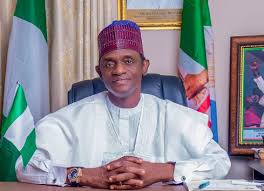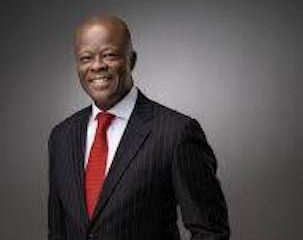NEWS
FG Launches Implementation of NSIP in Yobe

By Blessing Bature-Akpakpan, Abuja
In attending to the challenges in the country, the federal government of Nigeria has launched the implementation of the National Social Investment Program (NSIP) which is made up of four uniques clusters that are integrated to provide the maximum impact to the venerable.
The minister of Humanitarian Affairs, disaster management and social development, Sadiya Umar Farouq who was ably represented by the Zonal Monitor, Alhaji Ali Grema said the NSIP is strategically designed to fully involve all stakeholders most especially the State Governments.
She Said, “Based on the approval of Mr President, the anchor of these programmes in the State is the Focal Person appointed by His Excellency the Governor who provides the direct link with both the Ministry and the State Government through the Office of the Secretary of the State Government.
The Focal Person is expected to enhance the understanding of the different packages under the NSIP and to ensure that the beneficiaries are well targeted and affected.Farouq stated that His Excellency, President Muhammadu Buhari recognizing the social challenges in our Country decided to innovatively take proactive and decisive measures in fighting the effects of absolute poverty and its attending consequences. As a result of due consultations and research, he launched the implementation of the National Social Investment Program (NSIP) which is made up of four uniques clusters that are integrated to provide the maximum impact. In its implementation, the 4 clusters on the NSIP are:
The Conditional Cash Transfer (CCT) that is aimed at reducing the vulnerability of poor homes by providing monthly cash transfers of N5,000 and ensuring social inclusivity through deliberate humanitarian activites.
The National Home-Grown School Feeding program (NHGSFP) was designed as a multi-faceted intervention to drive school enrollment up, boost nutrition of the pupils, support local production of food and encourage employment and income generation. Specifically, it is aimed at the provision of one nutritious meal to all pupils in public primary schools in classes 1 to 3 to achieve these objectives.
The GEEP which is aimed at advancing micro soft loans with no requirement of collateral or any interest charges, adding that all these were deliberately designed to specifically target section of vulnerable Nigerians that include youths, elderly persons, widows, poorest of the poor, children, and micro businesspersons.
NEWS
Breaking: George Akume remains SGF – Presidency

The presidency says there has been no change in the status of Senator George Akume, as Secretary to the Government of the Federation.
This is according to a statement by Special Adviser to the President on Information and Strategy, Bayo Onanuga.
Mr Onanuga says President Bola Tinubu, currently in Saint Lucia, has not made any new appointments.
He described the information circulating about Akume’s replacement as untrue, adding that agents of mischief fabricated it.
GeorgeAkume
sgf
NEWS
Diri Campaigns Against Drug Abuse, Trafficking

From Mike Tayese, Yenagoa
Bayelsa State Governor, Sen. Douye Diri yesterday, led a campaign against drug abuse and illicit trafficking as part of activities commemorating the International Day Against Drug Abuse and Illicit Trafficking.
Diri advised people of the state, particularly the youths, to shun hard drugs and trafficking of illicit substances, saying they were harmful to their health and to the society.
The Bayelsa governor, who spoke shortly after the weekly Prosperity Walk exercise at the Samson Siasia Sports Complex in Yenagoa, also urged youths to develop themselves by acquiring a skill and work towards actualising their God-given potential.
“We just completed a nine to 10km walk, which is a test of our fitness. As it is said, health is wealth.
“Today is the International Day Against Drug Abuse and Illicit Trafficking. We are not only observing the global campaign, we are also leading it here in Bayelsa.
“No one in his right senses goes to commit crime and violent acts except that individuals are under the influence of hard drugs. My advice to youths is to be self-confident, have the fear of God and develop your innate potential for you to become a star.”
He implored youths to emulate the shining example of a Bayelsa-born United States-based athlete, Victory Godah, who was discovered through the state’s sports programmes.
He commended her gesture of donating sporting equipment as a way of giving back to the state.
“Victory Godah from Ekeremor local government area was discovered here and because of her skill, she is now at the University of Minnesota, United States. She has given back to the state through sports equipment so that more of us can have that access.”
In his remarks, the Commissioner for Health, Prof. Seiyefa Brisibe, emphasised the importance of the weekly walk, stating that participants above 40 years would have their blood pressure controlled after taking about 5,000 steps.
Also, state chairman of the Drug Abuse, Addiction, Prevention and Rehabilitation Committee, Dr Peter Owonaro, said the committee’s outreach in the state had been a huge success, noting that a recent research indicated that the drug abuse prevalence rate in Bayelsa dropped by five per cent from 21.4 per cent.
Also, the state commander of the National Drug Law Enforcement Agency (NDLEA), Kanu Sunny, lauded the state government for its unprecedented support in the fight against drug abuse and trafficking.
He said the campaign was taken to secondary schools as well as tertiary institutions and encouraged all to join in the war against the menace.
Foreign News
Ally of Cameroon President, 92, Quits ‘Broken’ Government to Challenge Him

Issa Tchiroma Bakary – a prominent minister and long-time ally of President Paul Biya – has quit Cameroon’s government, in the hope of ending 92-year-old Biya’s four-decade grip on power in upcoming elections.
Just four months before the central African nation went to the polls, Tchiroma said the Biya administration he belonged to had “broken” public trust and he was switching to a rival party.
“A country cannot exist in the service of one man,” he said on Wednesday.
While he was communications minister, Tchiroma notably came under fire for denying – then backtracking on his denial – that Cameroonian soldiers had killed women and children in a viral video.
His other roles during almost two decades in government include being a spokesman for the Biya government, and, until his resignation on Tuesday, he was employment minister.
Paul Biya – the world’s oldest head of state – has yet to confirm if he will attempt an eighth term as president. Last year, the country banned reports on the president’s health following rumours he had died.
As this election approaches, high unemployment and soaring living costs are of concern to many Cameroonians, as are corruption and security. A separatist insurgency in the English-speaking provinces as well as jihadists operating in the northernmost region have forced many thousands of Cameroonians from their homes in the past decade.
Cracks in Tchiroma’s relationship with President Biya were blown open earlier this month, when he told crowds in his home city of Garoua that Biya’s time in power had not benefited them in any way.
Tchiroma, widely reported to be 75, continued this criticism in a 24-page manifesto released a day after his resignation – promising to dismantle “the old system” so that Cameroon could move beyond “abuse, contempt, and the confiscation of power”.
One of his proposed solutions is federalism – he is offering to hold a referendum on devolving more power to Cameroon’s 10 provinces. This has long been mooted by many as a solution to the country’s so-called Anglophone crisis.
Specifically addressing English-speaking Cameroonians, who have long complained of marginalisation and discrimination in Francophone-dominated public institutions, he said “you do not need people to speak for you – you need to be listened to” and that “centralisation has failed”.
Tchiroma also used his manifesto to say Cameroon “has been ruled for decades by the same vision, the same system. This model, long presented as a safeguard of stability, has gradually stifled progress, paralysed our institutions, and broken the bond of trust between the state and its citizens”.
As the October presidential election approaches, rights groups have condemned the government’s crackdown on dissent.
Shortly after Tchiroma announced his plans to run for the presidency, the government reportedly announced a ban on all political activities by his Cameroon National Salvation Front (CNSF) party in a sub-district of the Far North region – a part of the country where he is said to be an influential power-broker.
Weeks earlier, fellow presidential hopeful Maurice Kamto had his movements curtailed during a two-day police stakeout in Douala, after promising supporters at a rally in Paris that he would protect Biya and his family if he wins in October.
Parliamentary elections that were also supposed to take place earlier this year have been delayed until 2026.
Reaction to Tchiroma’s presidential bid has been mixed – some think he is canny.
“By positioning himself as the elder statesman who ‘saw the fire coming’, Tchiroma is hedging that his break with Biya will be seen as bold – not opportunistic,” Cameroonian analyst and broadcaster Jules Domshe said.
“From economic fallout to youth unemployment, insecurity, and growing unrest in the North-West, South-West, and Far North [regions], Cameroon is ripe for change.”
Opposition voices are divided – some want Tchiroma to support Kamto, who was the runner-up in 2018 with 14% of votes. But others say he is tainted by his long association with Biya.
“He cannot embody change… He was part of the system for too long. The youth do not trust him,” says Abdoulaye Harissou, a legal notary and prominent critic once detained by the government.
Another member of the opposition – Jean Michel Nintcheu of the APC coalition – simply said: “We don’t see Tchiroma as a potential winner.”
| ReplyReply allForwardAdd reaction |




























